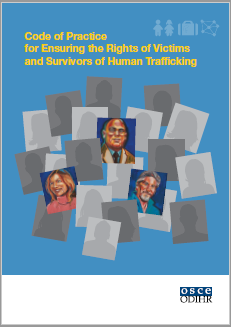Resources
Code of Practice for Ensuring the Rights of Victims and Survivors of Human Trafficking

In response to the lack of survivor inclusion to date, and in line with its objectives, ODIHR, in consultation with ISTAC and other relevant anti-trafficking stakeholders, developed this policy guidance. It reflects participating States’ obligations as well as international good practices to protect victims and survivors of human trafficking under international, regional and national laws as well as with National Referral Mechanisms (NRMs) or equivalent mechanisms. It aligns with OSCE commitments and draws on ODIHR’s NRM Handbook, which also recognizes the importance of the contributions of survivor leaders to all aspects of effective anti-trafficking work.
The Code of Practice seeks to provide guidance for participating States on ways to ensure not only the inclusion of victims’ and survivors’ voices but also their full engagement on all anti-trafficking responses. The lived experience and professional expertise of survivor leaders contributes to the understanding of the importance of ensuring a victim- and survivor-centred, child-friendly, age-appropriate, gender-sensitive, trauma-informed and human rights-based approach throughout the Code of Practice. The Code of Practice also gives participating States guidance on how to implement their commitments to protect the rights of trafficked people, including on identification and protection, support and access to services, justice and redress, social inclusion and victim- and survivor-engagement strategies.
The views, opinions, conclusions and other information expressed in this document are not given nor necessarily endorsed by the Organization for Security and Co-operation in Europe (OSCE) unless the OSCE is explicitly defined as the Author of this document.
